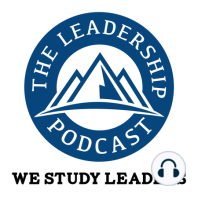44 min listen

TLP323: Make a Bigger Impact by Saying Less
TLP323: Make a Bigger Impact by Saying Less
ratings:
Length:
53 minutes
Released:
Sep 7, 2022
Format:
Podcast episode
Description
Joe McCormack is the author of “BRIEF: Make a Bigger Impact by Saying Less,” and “Noise: Living and Leading When Nobody Can Focus.” He founded the Brief Lab in 2013 after years dedicated to developing and delivering a unique curriculum for US Army Special Operations. He actively counsels military leaders and senior executives on effective, efficient communication, and produces the podcast, “Just Saying.” In this conversation, he shares the keys to thinking clearly to get to the root cause of a problem and explain the way forward, simply, concisely, and effectively. https://bit.ly/TLP-323 Key Takeaways [2:45] Joe is the sixth of nine children in his Irish Catholic family. His early career includes a period of aerospace marketing in the aviation field before he started a marketing agency. [4:28] Joe’s executive message about communication is “Less is more.” You don’t need to say much but what you say needs to count. Leaders tend to overwhelm people with information. Be more careful and calculating to be concise. You want to say more but people can’t hear it. [6:16] Joe explains why people say too much; a lack of time to prepare, the fear of not giving enough information, the fear of looking stupid, and the fear of failing to handle every contingency. It’s never just one of these things; it’s all of them. [6:45] People need to consider, “What does my audience need?” They don’t need six paragraphs. They’re craving brevity. They want two. Give the audience what they want: two well-written paragraphs. More paragraphs will dilute the message and diminish your impact. [7:54] When Joe wrote Brief he considered what was the most essential thing to say in the shortest time given. But don’t be too brief. Say what is necessary. When you learn the skills, you can use brevity consistently. There’s a payoff for people that have the skillset. [10:30] Joe asks people three questions about executive summaries: “Have you ever heard the term ‘executive summary’?” “Have you ever had a developer deliver one?” “Has anybody ever taught you how to build one?” People’s answers are normally, Yes, Yes, and No. If they say Yes to the third, Joe asks them how to build one. They don’t get it right. [11:33] Three questions to answer that will make a great executive summary: “What are you talking about?” “Why are we talking about this right now?” “So what now; what next?” [13:26] Joe teaches people the habit of briefly summarizing their message. It’s different than just knowing it. It’s a habitual way of thinking, speaking, and stopping from talking. [15:09] Fortune 500 corporations and Special Operations are alike in some ways. They both have high standards and expectations and they need to deliver, either for ROI or mission success. In the military, there is a lot of training. Corporations are starting to adopt more training. Since COVID-19 businesses are looking to attract talent. Communication and collaboration are how businesses work. [16:59] Collaboration works in moderation. Microsoft came out with a recent study that shows what people want most from their workplace is autonomy. They want to be left alone to think, and then when they collaborate, it’s better. If you don’t give people time to think about a problem, they come up with an answer on the fly. Deep problems don’t get solved on the fly, but only after thinking and then talking. [22:18] When planning a meeting, take 10 minutes of quiet. Then sit down and create an agenda of what you want to talk about; think about it, write it, and edit it. Then send it and follow it. It works. [23:09] There’s a time for collaboration, talking, and doing, and there’s a time for thinking. You have to figure out in your role, and what that time allotment is. Once you get that, you’re not doing too much or too little, you’re doing your job. Joe heard of a CEO who said, “I don’t think at work; I’m in meetings all the time.” The CEO needs time to think at work. [25:34] As leaders, you need to make a quiet app
Released:
Sep 7, 2022
Format:
Podcast episode
Titles in the series (100)
TLP019: If You’re Not Making Mistakes, You're Not Pulling Hard Enough: Global Teams Handle Adversity Fearlessly When They’re Diverse and Purposeful by The Leadership Podcast